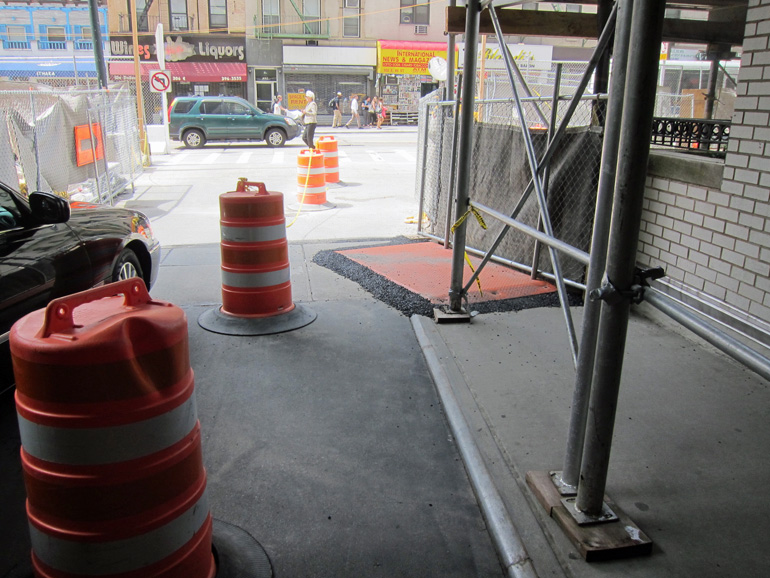Gotham Diary:
Another Adoption
7 June 2013
A pretty picture, ain’t it? Entrances to the new subway station are under excavation to either side of our driveway, which is already cluttered with the scaffolding required for the replacement of the building’s balcony railings. I suppose we’re lucky to be able to get in and out. A visitor queried elevator passengers the other day: was it always this noisy? (The sawing and the drilling of the balcony workers reverberates far and wide.) “It’s a war zone,” I said, as I tend rather fatuously to do, never having been in one. What I really mean is that the station’s work sites have made the intersection of 86th and Second something of a checkpoint, reminding me of Cold War Berlin (not that I’ve been there, either). The lady standing next to me said, “People in the front of the building have no life.”
Kathleen and I lived in an apartment on the front of the building for two years, and the street noise was plenty obnoxious then. I recall with special shudders the commercial refuse haulers who would grind their way down the street before sunrise, stopping every ten yards or so and lulling us back into dreams of quiet, only start up again momentarily. Now, what with the jackhammers and the blasting, it must be hell to spend the day at home for those overhead.
***
In the eighteen months since my aunt’s very unexpected death from complications of appendicitis, my thoughts about my adoptive father’s brother and his wife have shifted significantly. My feelings remain what they were, but I see them from a different perspective. The querulous egotism that marks every positive relationship (basically the late Mayor Koch’s question: “How’m I doing?”) gives way to something more Proustian. Instead of fretting over planning the next visit, or just picking up the phone (which I did quite often in the years after my uncle died) — instead of wondering what I ought to be doing, and looking forward to seeing and talking to them — I consider our connection with detachment, and I see, as I never did when they were alive, that I adopted them, I made more of them than anyone intended. When they were alive, I told everybody that I “adored” them, as indeed I did, but now I see something beneath that admiration, what might be called a neediness. I needed them because I admired them.
I won’t say that I ever wished that they were my parents instead. Some sort of taboo blocked longings of that sort. They had four children of their own whom they must necessarily prefer to me; recognition of this formal proposition is probably what licensed my interest and esteem, which certainly had no correlatives as regarded my actual parents. I admired my aunt and uncle because they were breezy and clever and well-read and unafraid of ideas. My uncle, unlike my father, was not embarrassed by his own intelligence. My aunt, who had written sonnets at Manhattanville and worked at Vogue, was unafflicted by the low-grade paranoia that paraded as my mother’s shrewdness. And she was my kind of woman. I see that now, too.
Yes. Although sophisticated and unsentimental (about people), and not, as I gathered from my cousins’ murmurs much later, the most maternal person in the world — she confessed to me herself that, although she dearly loved each of her children, she had not been able to care for them as babies — my aunt was more of a woman to me than my mother was. Isn’t that odd? Isn’t one’s mother ordinarily the template of womanliness? But mine was never mine, even before I found out that she was not my mother.
I suppose the current wisdom would hold that our bonding failed during my infancy. Whatever the cause, I thought that my mother was a strange sort of person, and frightening, too, because she did not handle finding me to be a strange sort of person at all well. And I still suspect that my sister and I were adopted to give my parents the appearance deemed suitable for membership in the senior-management class.
***
What is love? How do you know when you love someone? That you love someone? How can you be certain? What if it’s just the case that you want to love someone, because you’re supposed to, or you used to?
Such questions were a constant vexation to me, until I met Kathleen thirty-four years ago. I was very confused about love, but then she came along, and I learned that love is how I feel about her, and what motivates me to behave as I do. But because I was so old when I found out what love is — I had been on the point of learning, a few years earlier, when Megan was born, but the lesson was canceled and my feelings remained confused — I’m still astonished that she loves me. In black spells, I doubt that she does. (She is never nearby at such times — that’s the small part of the problem that ignites it.) Doubt is my default. As a boy, I knew that I was supposed to love my mother, and, wanting to be good, I wanted to love her. But I doubted that I did. I was often told that my behavior strongly indicated that I didn’t. Such comments clouded my grasp of love with frankly contractual concerns. On the subject of contracts, I am lucidity itself, a fount of judgments for all occasions. As to love, though, I know only that I found out what it was with Kathleen, and that she taught me, in her instinctive way, how to love the rest of my family. Instead of ignoring what I didn’t adore.

